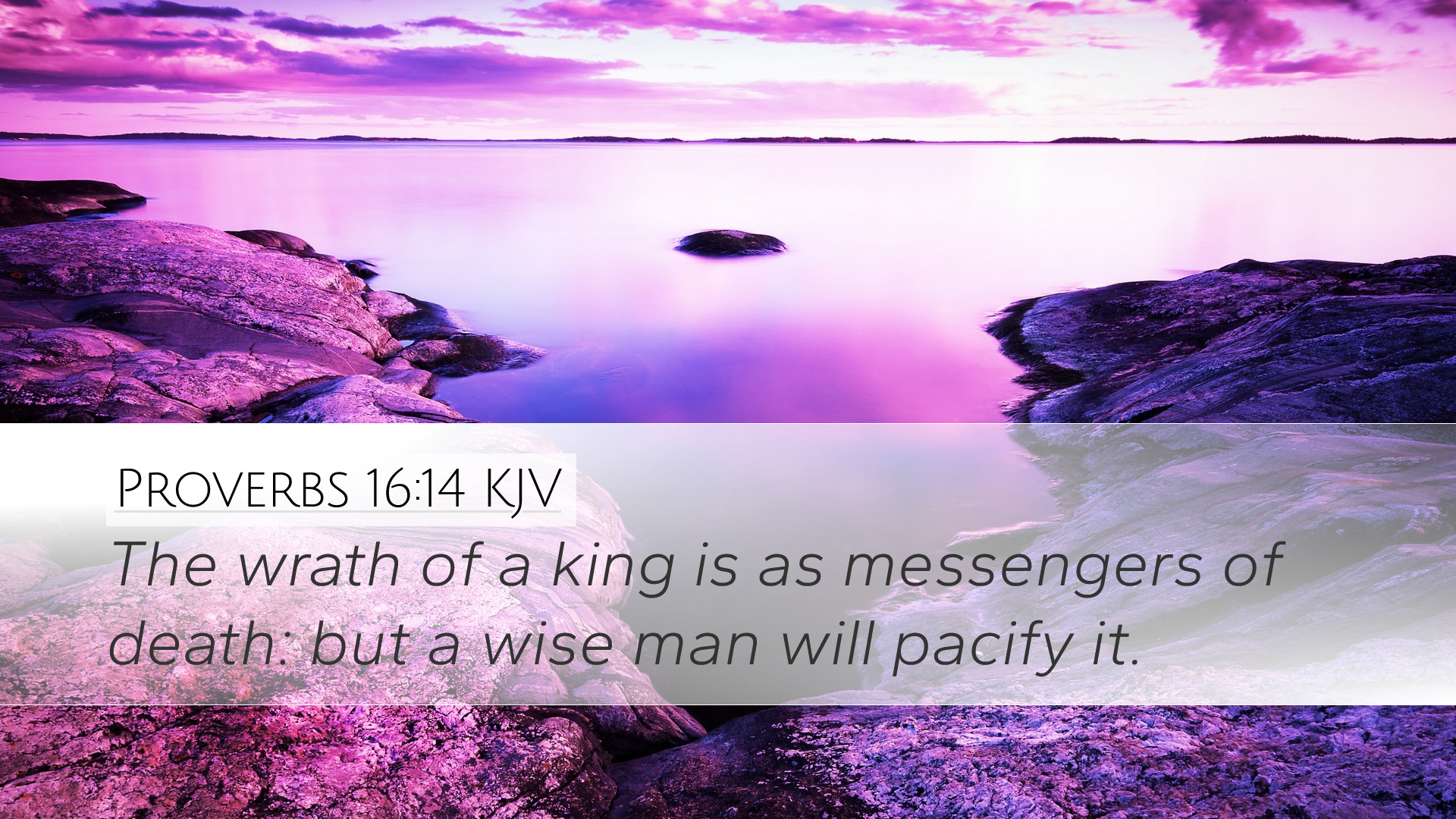Proverbs 16:14 Commentary
Verse: "The wrath of a king is as messengers of death: but a wise man will pacify it."
Introduction
The verse from Proverbs 16:14 offers profound insights into the nature of authority and the necessity of wisdom in dealings with those in power. This commentary aims to amalgamate the thoughts and reflections of esteemed public domain commentators like Matthew Henry, Albert Barnes, and Adam Clarke to explore the theological and practical implications of this verse.
Exegesis of the Verse
This proverb juxtaposes the potential devastation of royal anger with the virtues of wisdom in mitigating such wrath. Understanding this context is crucial for pastors, theologians, and scholars alike.
The Wrath of a King
Matthew Henry emphasizes that kings possess significant power, and their displeasure can lead to dire consequences. The phrase “as messengers of death” suggests that when a king’s anger is provoked, it can result in disastrous outcomes not just for individuals but also for nations.
Albert Barnes similarly interprets that the influence a king holds can be fatal, as he has the authority to execute judgment and to impose harsh penalties. This warns us of the seriousness of a monarch's displeasure and the weight of their decisions in governance.
The Role of Wisdom
In contrast, the latter part of the verse introduces the powerful efficacy of wisdom. Adam Clarke points out that a wise man, equipped with understanding, knows how to engage with authority appropriately. He is capable of “pacifying” a king, which indicates the importance of diplomacy, tact, and foresight in governance and interpersonal relations.
Matthew Henry elaborates further, suggesting that wisdom involves discernment—knowing when to speak and when to remain silent, how to approach with humility, and the ability to diffuse situations before they escalate. This skill is not only beneficial in the realm of human relationships but also with regard to one’s relationship with God.
Theological Implications
This verse presents deep theological insights regarding the nature of authority and human interactions:
- The Sovereignty of God: The kings' power is ultimately subject to divine authority. While they wield significant influence, they are also accountable to God.
- The Responsibility of Leadership: Leaders are reminded of the magnitude of their decisions and the impact their actions have on their subjects’ lives.
- The Importance of Wisdom: Wisdom is framed as a divine gift that not only leads to personal success but also fosters peace within communities.
- The Interplay of Justice and Mercy: A wise approach may include advocating for justice while simultaneously demonstrating mercy—a crucial balance in leadership.
Practical Applications
For pastors and leaders in the church, this verse serves as a poignant reminder of the need for wisdom in their ministries:
- Engaging with Authority: Understanding the dynamics of authority can guide church leaders in their dealings with governmental and civic entities.
- Conflict Resolution: Leaders are tasked with resolving conflicts within their congregations, and wisdom is paramount in doing so peacefully and constructively.
- Fostering a Culture of Wisdom: Encouraging members of the congregation to seek wisdom in their own lives can lead to a more harmonious and edifying community.
- Prayer for Leaders: The congregation should pray for leaders—both spiritual and secular—to be endowed with wisdom, especially in times of crisis.
Conclusion
Proverbs 16:14 encapsulates a timeless truth regarding the balance of power, authority, and the need for wisdom in interactions. Through the reflections of historical commentaries, it is evident that the wisdom of the wise serves as a buffer against the unforgiving nature of power, promoting understanding and peace. Pastors, theologians, and scholars can draw rich insights from this scripture, encouraging a blend of humility and strategy in efforts to navigate the challenging landscapes of leadership and authority.


